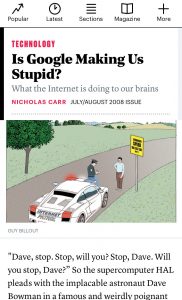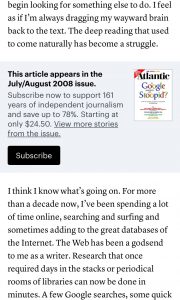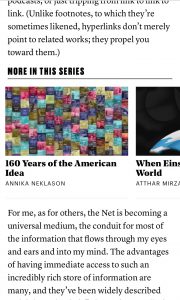Technology is improving every day. The more advanced it gets; the more humans fear how it will affect themselves and the people around them. Today’s humans invented something called the eBook. This technological device allows readers to read and find various types of books online. eBooks are very convenient and are faster to gain access to. There is no longer a need for people to travel outside of their homes to go to a library if they need a book for any reason. However, problems arise when readers come across ads while reading, which is considered a major distraction, and can leave people deuterated from the purpose of being on that particular site. Nicholas Carr, author of the article “Is Google Making Us Stupid?” published in July/August 2008 in The Atlantic, Carr argues that technology is hindering our ability to comprehend. He persuades his audience of men and women of the ages thirty through fifty with ethos, and a personal appeal. Nicholas Carr has written for The Atlantic, the Wall Street Journal, the New York Times, Wired, Nature, MIT Technology Review, and many other periodicals. His essays including “Is Google Making Us Stupid?” and “The Great Forgetting,” has been collected in several anthologies, including The Best American Science and Nature Writing, The Best Spiritual Writing, and The Best Technology Writing. In 2015, he received the Neil Postman Award for Career Achievement in Public Intellectual Activity from Media Ecology Association (Nicholas Carr)
In Carr’s article “Is Google Making Us Stupid” he first uses a personal appeal to describe why he is unfavorable towards online reading. He described himself before online reading “Once I was a scuba diver in a sea of words (Is Google Making Us Stupid)”. Now after participating in online reading he says, “Now I zip along the surface like a guy on a Jet Ski.” (Is Google Making Us Stupid, Carr}. These choice of words shows his purpose of writing the article which is to spread awareness of what online reading is lacking for humans mentally. Once feeling like he was able to dissect the information and connect with the information in front of him it is now as if he can barely skim the surface. Reading online can have a disconnect from the reader to the book. Creating the ability for people to have to work smarter not harder. In the article many people have made a comment saying we would all “be better off” if our brains were supplemented, or even replaced, by an artificial intelligence is unsettling. (Is Google Making Us Stupid, Carr)
Carr’s audience is targeted to men and women of the ages thirty through fifty. Generations that are not a part of the digital generation which means the generation of humans whose generational location places their birth and developmental experience during a time of widespread to digital computing (IGI Global, 2016), tend to dislike technology due to the discomfort of unfamiliarity. Humans who are born into the generation are young and are very familiar with how technology operates. Young adults and children would rather hear the good technology has done rather than what it is doing to hinder their learning which will gain confusion as schools began to teaching students using smart devices such as computers.
Being as though people are utilizing technology as much as possible, it has become a way to make technology have super intelligence. This is where humans are relying on computers to know more information when asked. Google has the answer to majority of questions when it is asked along with other people’s opinion. In Mountain View, California, Taylorism; the principles or practice of science is home to Google’s headquarters where executive, Eric Schmidt is “a company that’s founded around the science of measurement,” and is striving to “systematic everything” (Is Google Making Us Stupid, Schmidt).
Carr uses ethos to illustrate that technology is hindering our brains by allowing his audience to see a different perspective through some well-known people who also agree with his claim. Hieronimo Squarciafico worried that easy availability of books would lead to intellectual laziness, making men “less studious” and weakening their minds (Is Google Making Us Stupid, Carr). This makes people who admire Squarciafico keep an open mind to what Carr is trying to persuade to his readers about the effects of the internet. As Carr continues to add people who are credible to this article more people will believe that this article is worth reading.
In conclusion there are many situations to where online reading can be great for its convenience but there are situations where traditional reading is more effective for processing information and truly understanding the meaning of what the reader just read. As we come to rely on computers to mediate our understanding of the world, it is our own intelligence that flattens into artificial intelligence (Is Google Making Us Stupid, Kubrick Dark). The more the internet grows it gets smarter and humans grow depended on artificial intelligence instead of gaining natural intelligence.
Part 2
For color there is a bright red color which is bolded of the authors name “Nicholas Carr”and the and the the topic which is Technology. The next color is black which is in a large font titled “Is Google Making Us Stupid” I see a lot of ads which through me off track a couple times. Most of the ads are off topic and does not help the author with his claim. There was a picture of a man being stopped by the internet patrol however he has a book in his hand in his hands so I am thinking he is in violation of reading to slow because of how high the speed limit is.


